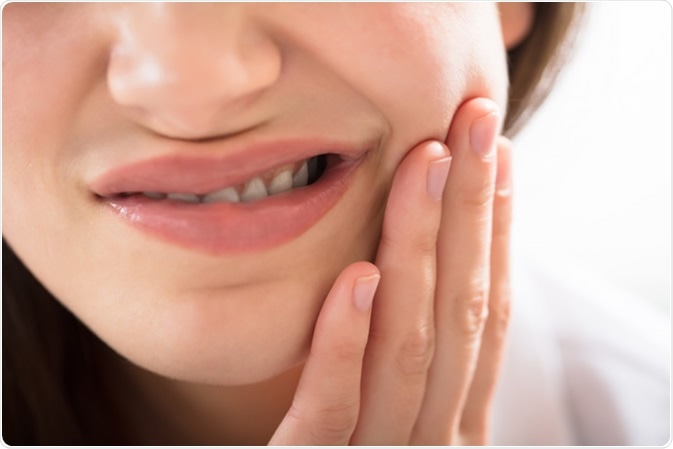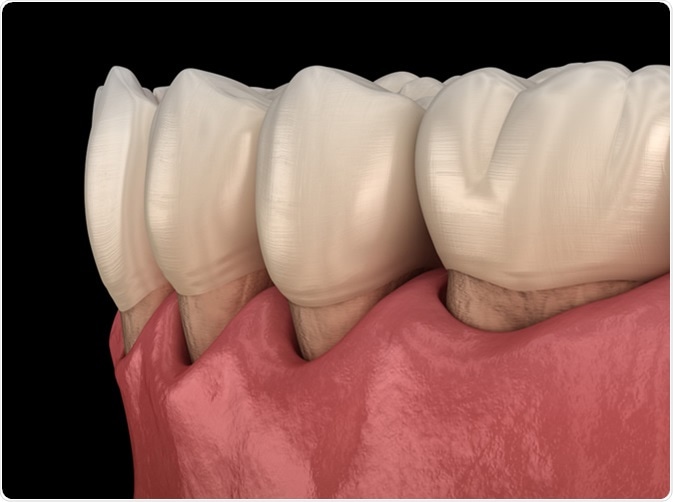Dentin hypersensitivity is among the most frequently reported dental concerns. This condition primarily occurs due to dentin exposure to thermal, chemical or osmotic stimuli, thereby causing extreme sensitivity and pain. The dentin is the part of the tooth structure directly underneath the enamel.
Dentin hypersensitivity is also referred to as dentin sensitivity. This can cause significant deterioration of the quality of life of the affected individual, because of the pain, which may strike while doing something as routine as eating something cold or hot, and the poor aesthetic appearance.
Skip to

Image Credit: Andrey_Popov / Shutterstock
What are the various causes of dentin hypersensitivity?
Dentin sensitivity is the sequel to dentin exposure. One of the chief causes of dentin exposure is a receding gum line which exposes the roots of the teeth. Unlike the tooth crown, the roots are not covered by the hard protective layer referred to as enamel. Roots are primarily composed of tiny tubules, which act as a link to the nerve supplying the tooth. When they are exposed to stimuli such as sweet, cold or hot foods and drinks, the affected person experiences an extreme sensation which is referred to as dentin hypersensitivity.
What factors can trigger dentin hypersensitivity?
Various factors can predispose an individual to dentin hypersensitivity, such as:
- Coarse tooth brushing –Brushing the teeth too hard can wear off the protective enamel covering the tooth. Damage to the enamel causes the dentin to become exposed, thereby causing dentin hypersensitivity.
- Gum Recession - One of the leading causes of gum recession is periodontal (gum) diseases. Gum disease can cause the gums to recede from the gum line, causing the dentin below to be exposed; this leads to dentin sensitivity.
- Fractured teeth - Broken teeth may allow bacteria to find their way into the pulp of the teeth, resulting in inflammation and tooth sensitivity
- Grinding of teeth - Regular clenching or grinding of the teeth, as in bruxism, may also cause deterioration of the protective enamel, resulting in dentin sensitivity.
- The overuse of abrasive agents like hydrogen peroxide or baking soda for tooth whitening may also result in damage to the tooth enamel and exposure of the deeper tooth layers, leading to tooth sensitivity.
- Accumulation of plaque on the tooth surface may also contribute to tooth sensitivity
- The overenthusiastic use of mouthwashes could also increase the chances of tooth sensitivity especially if the dentin is exposed. Acids present in the mouthwash may further exaggerate the tooth sensitivity
- Enamel erosion, particularly that caused by the consumption of highly acidic foods like pickles, tomatoes and tea, can result in dentin sensitivity.
- Certain dental procedures like tooth scaling, tooth crowning, tooth fillings may cause dentin sensitivity. However, the sensitivity caused by these procedures usually recovers within 4 to 6 weeks post procedure.

Gum recession process. 3D illustration. Credit: Alex Mit / Shutterstock
How is dentin hypersensitivity treated?
An accurate diagnosis of dentin hypersensitivity is required before initiating any treatment. The medical history will help to establish pain intensity, pain stability and factors that exaggerate or reduce the pain. Various diagnostic methods may be employed, such as the use of a jet of air, a water spray, or a probe, to elicit sensitivity of the suspect tooth.
Post-diagnosis, dentin hypersensitivity is treated by below mentioned various methods such as:
Removal of factors contributing towards dentin hypersensitivity: Correction of etiological factors like faulty tooth brushing technique, correction of problems with dentition such as premature occlusal contacts, and restricting the consumption of highly acidic foods, are all important in treating dentinal hypersensitivity.
Treating dentin hypersensitivity by the application of desensitizing agents: Various types of desensitizing agents are available to relieve sensitivity. These are basically classified into two types based on the method of application:
- Application at home - This method is uncomplicated and rational, wherein the patient can self-apply the desensitizing agent. Some of the at-home desensitizing agents are in the form of mouthwashes, chewing gums, toothpastes, and tooth powders
- Application in dental clinics – Unlike home methods, this method covers fewer teeth, and is more expensive. Some of the common desensitizing agents include potassium nitrate, 2% sodium fluoride, oxalates, varnishes, dentin bonding agents and composite, and bioglass. These agents release their effects either by sealing the dentinal tubules or by interrupting the conduction of nerve impulses causing the pain.
Further Reading
Last Updated: May 15, 2019